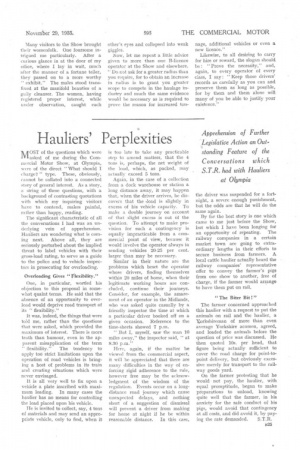Hauliers' Perplexities
Page 39

If you've noticed an error in this article please click here to report it so we can fix it.
Apprehension of Further Legislative Action an Outstanding Feature of the Conversations which S.T.R. had with Hauliers at Olympia
h A OST of the questions which were iv I asked of me during fhe Commercial Motor Show, at Olympia, were of the direct "What should I charge? " type. These, obviously, cannot be collated into a connected story of general interest. As a story, a string of these questions, with a background of contrasting quotations with which my inquiring visitors have to contend, makes painful, rather than happy, reading.
The significant characteristic of all the conversations I had was an underlying vein of apprehension. Hauliers are wondering what is coming next. Above all, they are seriously perturbed about the implied threat to label vehicles with their gross-load rating, to serve as a guide to the police and to vehicle inspectors in prosecuting for overloading.
Overloading Gives " One, in particular, wattled his objection to this proposal in somewhat quaint terms. He said that the absence of an opportunity to overload would deprive road transport of its " flexibility."
It was, indeed, the things that were told me, rather than the questions that were asked, which provided the maximum of interest. There is more truth than humour, even in the apparent misapplication of the term " flexibility." The tendency to apply toci strict limitations upon the operation of road vehicles is bringing a host of problems in its train and creating situations which were never envisaged.
It is all very well to fix upon a vehicle a plate inscribed with maximum loading. In many cases the haulier has no means for controlling the load placed upon his vehicle.
He is invited to collect, say, 4 tons of materials and may send an appropriate vehicle, only to find, when it is too late to take any practicable step to amend matters, that the 4 tons is, perhaps, the net weight of the load, which, as packed, may actually exceed 5 tons.
Again, in the case of a collection from a dock warehouse or station a long distance away, it may happen that, when the driver arrives, he discovers that the -load is slightly in excess of his vehicle capacity. To make a double journey on account of that slight excess is out of the question. To attempt to make provision for such a contingency is equally impracticable from a commercial point of view, because it would involve the operator always in sending vehicles 20-25 per cent. larger than may be necessary.
Similar in their nature are the problems which beset the operator whose drivers, finding themselves within 20 miles of home, when their legitimate working hours are concluded, continue their journeys. Consider, for example, the amazement of an operator in the Midlands, who was asked quite casually by a friendly inspector the time at which a particular driver booked off on a given occasion. Reference to the time-sheets showed 7 p.m.
" But 1, myself, saw the man 10 miles away," the inspector said, " at 8.30 p.m."
Here, again, if the matter be viewed from the commercial aspect, it will he appreciated that there are many difficulties in the way of enforcing rigid adherence to the rule, however free may be thc acknowledgment of the wisdom of the regulation. Events occur on a longdistance road journey which cause unexpected delays, and nothing short of a suggestion of dismissal will prevent a driver from making for home at night if he be within reasonable distance. In this case, the driver was suspended for a fortnight, a severe enough punishment, but the odds are that he will do the same again.
By far the best story is one which came to me just before the Show, but which I have been longing for an opportunity of repeating. The railway companies in a certain market town are going to extraordinary lengths in their efforts to secure business from farmers. A local cattle haulier actually heard the railway companies' representative offer to convey the farmer's pigs from one show to another, free of charge, if the farmer would arrange to have them put on rail.
"The Biter Bit!"
The farmer concerned approached this haulier with a request to put the animals on rail and the haulier, a Y,orkshireman of more than even average Yorkshire acumen, agreed, and loaded the animals before the question of price was discussed. He then quoted 10s. per head, that figure being actually sufficient to cover the, road charge for point-topoint delivery, but obviously excessive merely for transport to the railway goods yard.
On the farmer protesting that he would not pay, the haulier, with equal promptitude, began to make preparations to unload, knowing quite well that the farmer, in his anxiety for the safe conduct of his pigs, would avoid that contingency at all costs, and did avoid it, by pay ing the rate demanded. S.T.R.




























































































